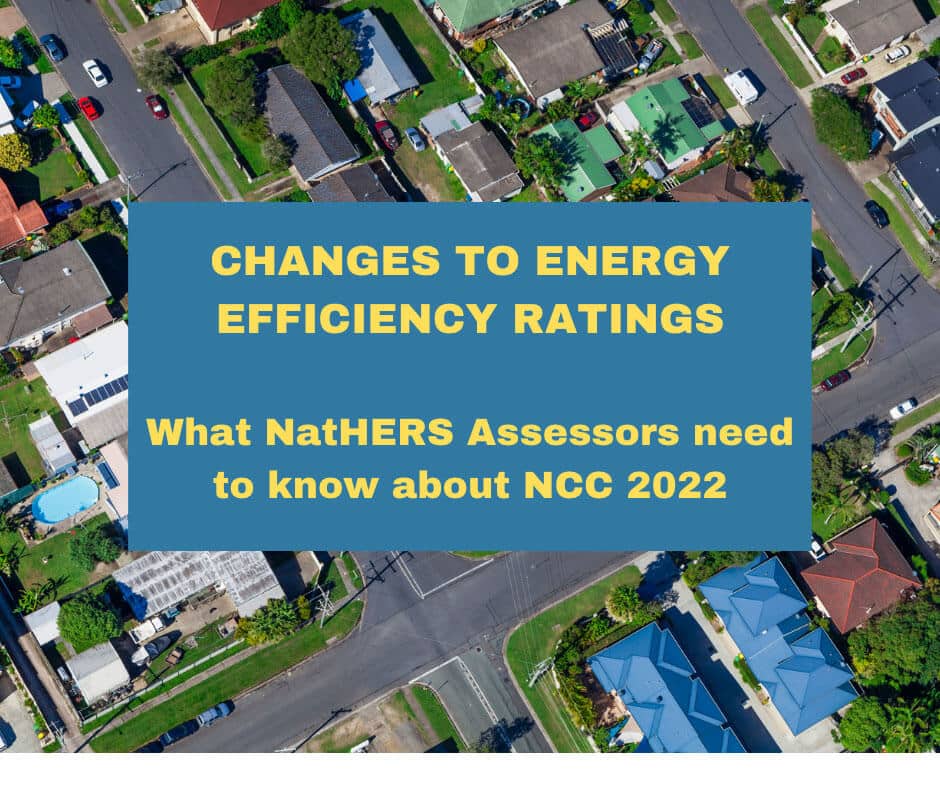Changes to Energy Efficiency Ratings: What NatHERS Assessors need to know about NCC 2022
Big changes are coming to the National Construction Code in 2023, so what do NatHERS assessors need to be aware of? In this article, we break down the key energy efficiency changes you need to know.
The NCC is seeing significant changes in terms of residential energy efficiency, with new provisions and some improvements to the existing provisions. In fact, the overhaul to the Nationwide House Energy Rating Scheme (NatHERS) is the biggest since it first began 30 years ago.
But not every state and territory is passing on the changes in full. So, for NatHERS assessors, it’s important you know the changes and how they will impact your work.
What are the NCC changes to energy efficiency requirements?
There are two key elements to the National Construction Code changes relating to energy efficiency:
- Minimum energy efficiency requirements increase to 7 stars
The minimum energy efficiency requirements for new houses and apartments are increasing from the NatHERS equivalent of 6 stars to 7 stars.
The goal is to deliver a significant improvement in thermal comfort for occupants.
NatHERS currently provides a rating out of 10 stars taking into account the home’s design and construction materials including walls, insulation, windows and roofs.
This change means new houses built after October 1, 2023, must have at least a 7-star rating.
The higher rating can comprise:
- Higher window and door glazing performance
- Increases in ceiling and wall insulation R- values
- Restrictions on wall and roof colours
- Changes to structural floor systems e.g. insulated slabs or sub-floor insulation
- Annual energy use budget
A new whole-of-home annual energy use budget now needs to be met by new homes.
Rated out of 100, the budget encourages residential builders and designers to consider the efficiency of appliances they recommend to clients.
The budget applies to the energy use of a home’s heating and cooling equipment, hot water systems, lighting, and swimming pool and spa pumps.
Renewable energy systems, such as rooftop solar panels, aren’t mandatory as part of this change, but they can be installed to help keep a home’s energy use under the required budget.
Who do the NCC changes apply to?
The new residential energy efficiency provisions apply to houses and other low rise multiple dwelling projects (Class 1 buildings) and apartment buildings (Class 2 sole-occupancy units and Class 4 parts of buildings).
Why make changes to energy efficiency requirements?
Australia’s residential building sector accounts for 11% of total energy, approximately 23% of electricity consumption, and is responsible for some 11% of national greenhouse gas emissions.
But it doesn’t have to be that way.
According to Alan Pears, an energy expert at RMIT University, “Going from six to seven stars cuts thermal energy use by 20-27%.”
These updates will also help new homeowners save an average of $183 on their power bills every year, which is a significant benefit as energy costs soar.
When do the changes roll out?
The national transition period is from 1 May 2023, with changes becoming mandatory from 1 October 2023. However, some states are delaying the start.
Regulation changes by state
State and territory legislation mandates which edition of the NCC applies to a particular project. So it’s essential to take note of the different state and territory application of changes, and always check with your jurisdiction for each project:
New South Wales
The Minister for Planning and Minister for Homes announced increased BASIX standards for energy use and thermal performance which will start on 1 October 2023 under the new State Environmental Planning Policy (Sustainable Buildings) 2022.
Improvements to BASIX standards include thermal performance standards in line with a 7-star rating. They will vary with floor area, taking into consideration the area and number of people living in the space, as well as the number of floors in an apartment block to account for energy consumption of shared services in high rise buildings.
Developers and homeowners can choose from a range of measures to meet the higher thermal performance and energy standards as part of the design for development approval.
These can include:
- installing more insulation
- improving the performance and location of windows, as well as using good airflow, shading and sunlight to cool and heat homes naturally
- installing a more energy-efficient hot water system, such as an electric heat pump or a solar hot water system
- installing photovoltaic panels to supplement a 5-star gas hot-water system
- choosing a more efficient heating and cooling system, such as a 3-star reverse cycle air-con system.
Victoria
Victoria has agreed to increase minimum energy efficiency building standards for new homes from 6 to 7 stars under the NCC changes.
Victoria will also remove barriers to installing efficient electric hot water systems, which will help households gain further benefits from investing in solar panels and support those who choose all-electric new homes.
Double glazing will not be mandatory, though most homes will require high performance glazing. This means features that reduce unwanted heat gain or heat loss, such as double or triple glazing, low emissivity (‘low-e’) glass, and thermally broken window frames.
In NCC 2019, Victoria varied the energy efficiency standards to require either a solar water heater or a rainwater tank connected to toilets to be installed in new Class 1 homes. This variation has been removed from NCC 2022 to avoid conflicts with the new ‘whole of home’ energy usage requirements.
Tasmania
Tasmania is deferring its application of the 7-star NatHERS energy efficiency rating provisions until the next iteration of the NCC in 2025.
Queensland
Since 2010, the Queensland Development Code (QDC) has allowed optional credits for an outdoor living area / ceiling fan and photovoltaic solar to meet the 6-star energy efficiency requirement.
In climate zones 1 and 2, there are also reduced glazing requirements and an exemption for insulation under suspended floors.
For NCC 2022, the Queensland Government has committed to moving up to 7 stars and removing QDC nominal credits and exemptions for glazing and suspended floor.
Northern Territory
The Northern Territory has opted out of changes for the NCC.
Instead, the NT will continue to build new houses with just 5-star energy efficiency ratings under BCA 2009.
Western Australia
Western Australia is modifying the residential energy efficiency provisions in Volume One of NCC 2022 for Class 2 buildings. Until 30 April 2025, the following is allowed:
- Sole-occupancy units, where the building is more than 6 storeys, can collectively achieve an average of 7 stars, and individually achieve an energy rating of not less than 5 stars.
- Sole-occupancy units, where the building is 6 storeys or less, can collectively achieve an average of 6 stars and individually achieve an energy rating of not less than 5 stars.
The residential energy efficiency provisions of NCC 2022 Volume 1 for Class 2 buildings will then become mandatory on 1 May 2025.
Volume Two of NCC 2022 (which contains requirements for certain residential and non-habitable buildings and structures) will become mandatory in WA on 1 May 2025.
Until then, you can continue to use NCC 2019 Amendment 1 or start using NCC 2022.
Prepare for changes
NatHERS has the latest resources to help you stay up to date with changes to energy efficiency ratings:
- Updated NatHERS Software Accreditation Protocol and NatHERS Technical Note
- New NatHERS worked examples
- New NatHERS Certificates
- New NatHERS Protocol for Assessor Accrediting Organisations
- Fact sheets for assessors and industry
References
Department of Climate Change, Energy, the Environment and Water: https://www.energy.gov.au/news-media/news/national-construction-code-ncc-updates-mean-energy-efficiency-ratings-expansion-new-residences
The Guardian Australia:
ABCB
https://www.abcb.gov.au/news/2022/overview-changes-energy-efficiency-and-condensation
NSW Department of Planning and Environment
Victorian Government
Master Builders Queensland
https://www.mbqld.com.au/about/policy-and-advocacy/measure-twice/our-concerns/energy-efficiency
Health Habitat
https://www.healthabitat.com/news-policy-ministers-agree-to-new-minimum-building-performance/
Government of Western Australia






